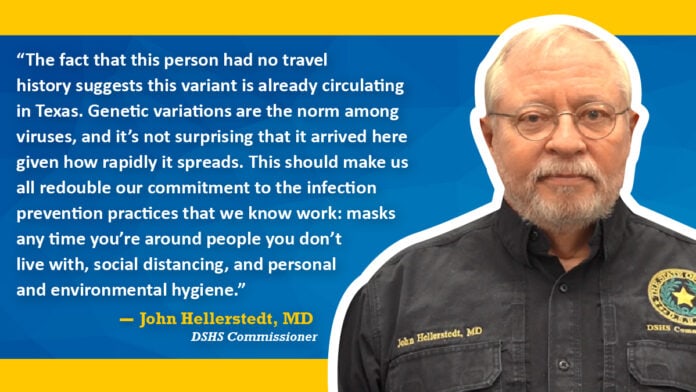B.1.1.7 Variant Believes To Be Significantly More Contagious
The first known Texas case of the COVID-19 B.1.1.7 variant has been identified in a resident of Harris County. The adult male resident, who has no history of travel, was recently diagnosed with COVID-19. Results of genetic sequencing this week showed that the infection was caused by the variant strain. The case is being investigated by Harris County Public Health and the Texas Department of State Health Services.
“The fact that this person had no travel history suggests this variant is already circulating in Texas,” said Dr. John Hellerstedt, DSHS commissioner. “Genetic variations are the norm among viruses, and it’s not surprising that it showed up here given how rapidly it spreads. This should make us all redouble our commitment to the infection prevention practices that we know work: masks any time you’re around people you don’t live with, social distancing, and personal and environmental hygiene.”
The B.1.1.7 variant was first identified in the United Kingdom in the fall and appears to spread much more easily from person to person than most strains of the coronavirus. The current scientific evidence is that the variant does not cause more severe disease and that vaccines are expected to be effective against it. It is thought to be responsible for only a small proportion of the current COVID-19 cases in Texas and the United States.
The latest on COVID-19 in Texas is available at dshs.texas.gov/coronavirus, including daily case data and information on testing and vaccination.
B.1.1.7 Variant Currently Reported In Six States
Dr. Eric Ding, epidemiologist and health economist, says the new variant will be the dominant strain by February and the US needs to take action now to reduce the spread.
⚠️CRUSH VIRUS NOW OR ELSE WE ARE SCREWED: Denmark’s CDC thinks new B117 #SARSCoV2 variant is so much more contagious (R +0.4 to +0.7) & inevitable that **if any country does not crush the R<0.7 now**, we will be completely #COVID19 screwed by Feb/March.🧵
https://t.co/CG1iZNx6uI pic.twitter.com/W7v1iAsgw3— Eric Feigl-Ding (@DrEricDing) January 6, 2021
Currently the CDC has reported at least 26 cases in California, 22 cases in Florida, two cases in Colorado, and one case each in Georgia, New York and Texas. CDC has announced plans to increase their SARS-CoV-2 Strain Surveillance (NS3) program with plans by the end of the month to evaluate at least 10 samples per state biweekly for sequencing and further characterization.













